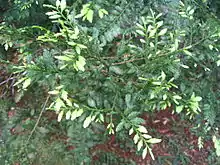| Dacrycarpus | |
|---|---|
 | |
| Dacrycarpus dacrydioides | |
| Scientific classification | |
| Kingdom: | Plantae |
| Clade: | Tracheophytes |
| Clade: | Gymnospermae |
| Division: | Pinophyta |
| Class: | Pinopsida |
| Order: | Araucariales |
| Family: | Podocarpaceae |
| Genus: | Dacrycarpus (Endlicher) de Laubenfels |
| Type species | |
| Dacrycarpus dacrydioides | |
| Species | |
| Synonyms | |
| |
Dacrycarpus is a genus of conifers belonging to the family Podocarpaceae.[2] The genus includes nine species of dioecious evergreen trees and shrubs to 55–60 metres (180–197 ft) in height.[3]
Species
The species of Dacrycarpus range from New Zealand and Fiji, across New Caledonia, New Guinea, Indonesia, Malaysia and the Philippines to northern Myanmar and southern China. The greatest diversity (five species) exists in New Guinea.
| Phylogeny of Dacrycarpus[4][5] | |||||||||||||||||||||||||||||||||||||||||||||
|---|---|---|---|---|---|---|---|---|---|---|---|---|---|---|---|---|---|---|---|---|---|---|---|---|---|---|---|---|---|---|---|---|---|---|---|---|---|---|---|---|---|---|---|---|---|
|
| Image | Scientific name | Distribution |
|---|---|---|
| Dacrycarpus cinctus | Indonesia and Papua New Guinea. | |
| Dacrycarpus compactus | Indonesia and Papua New Guinea. | |
| Dacrycarpus cumingii | Indonesia, Malaysia, and the Philippines. | |
 | Dacrycarpus dacrydioides | New Zealand |
| Dacrycarpus expansus | Papua New Guinea. | |
 | Dacrycarpus imbricatus | Cambodia, China, Fiji, Indonesia, Laos, Malaysia, Papua New Guinea, the Philippines, Thailand, Vanuatu, and Vietnam |
| Dacrycarpus kinabaluensis | Mount Kinabalu in Sabah, Malaysian Borneo. | |
| Dacrycarpus steupii | Indonesia. | |
| Dacrycarpus vieillardii | New Caledonia. | |
References
- ↑ G. J. Jordan. 1995. Extinct conifers and conifer diversity in the Early Pleistocene of western Tasmania. Review of Palaeobotany and Palynology 84(3): 375-387. "Two new, extinct species of conifer are described from Early to possibly Middle Pleistocene sediments at Regatta Point, western Tasmania. Dacrycarpus carpenterii Jordan, sp. nov. (Podocarpaceae) has morphological similarities to extant D. dacrydioides from New Zealand."
- ↑ Christopher N. Page. 1990. "Podocarpaceae" pages 332-346. In: Klaus Kubitzki (general editor); Karl U. Kramer and Peter S. Green (volume editors) The Families and Genera of Vascular Plants volume I. Springer-Verlag: Berlin;Heidelberg, Germany. ISBN 978-0-387-51794-0
- ↑ James E. Eckenwalder. 2009. Conifers of the World. Timber Press: Portland, OR, USA. ISBN 978-0-88192-974-4.
- ↑ Stull, Gregory W.; Qu, Xiao-Jian; Parins-Fukuchi, Caroline; Yang, Ying-Ying; Yang, Jun-Bo; Yang, Zhi-Yun; Hu, Yi; Ma, Hong; Soltis, Pamela S.; Soltis, Douglas E.; Li, De-Zhu; Smith, Stephen A.; Yi, Ting-Shuang; et al. (2021). "Gene duplications and phylogenomic conflict underlie major pulses of phenotypic evolution in gymnosperms". Nature Plants. 7 (8): 1015–1025. bioRxiv 10.1101/2021.03.13.435279. doi:10.1038/s41477-021-00964-4. PMID 34282286. S2CID 232282918.
- ↑ Stull, Gregory W.; et al. (2021). "main.dated.supermatrix.tree.T9.tre". Figshare. doi:10.6084/m9.figshare.14547354.v1.
{{cite journal}}: Cite journal requires|journal=(help)
External links
This article is issued from Wikipedia. The text is licensed under Creative Commons - Attribution - Sharealike. Additional terms may apply for the media files.